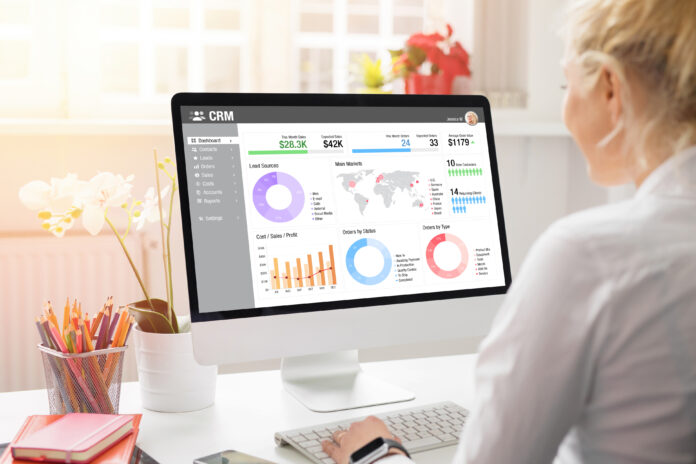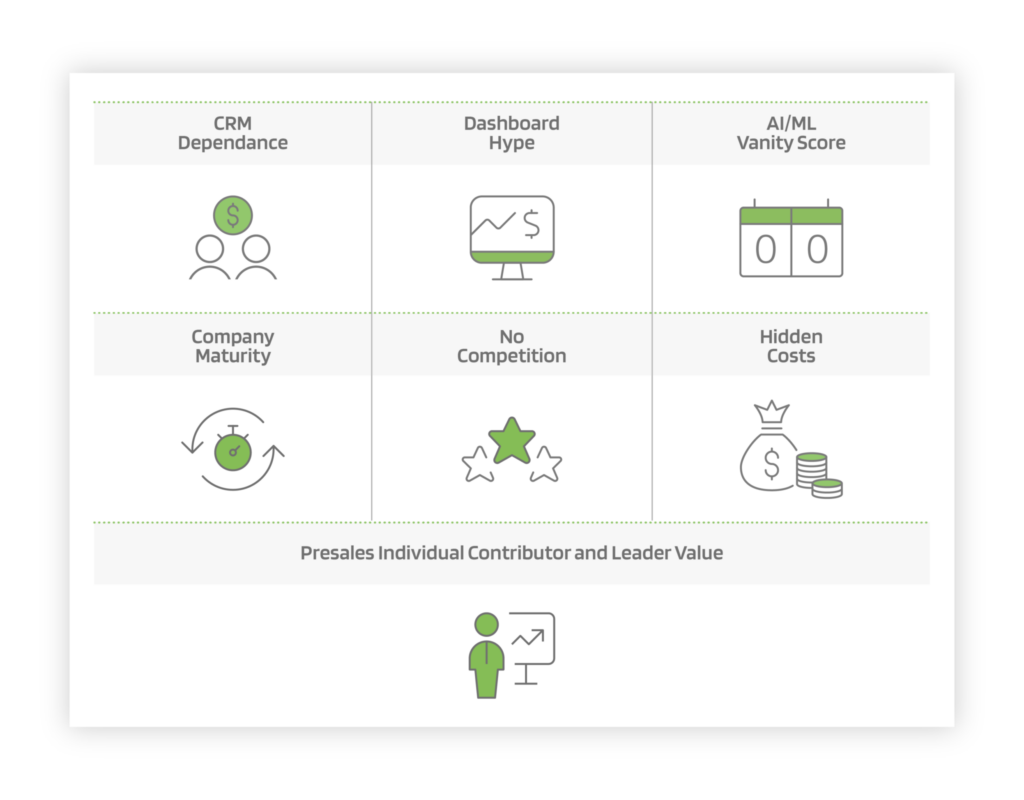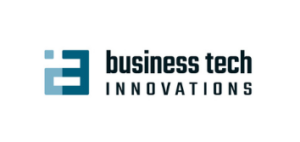
For decades, you, the sales engineers and presales professionals, have had to build your own tools or utilize what was given to you, mainly general-purpose tools like spreadsheets and CRM (customer relationship management), to support your daily work needs. However, in recent years, commercial software vendors have emerged to help you be more effective. Specifically, commercial presales platforms are now available to help sales engineers perform daily work like managing activities, tracking performance., managing presales opportunities, following prescriptive processes, and capturing product feature gaps.
The presales tooling market is fairly nascent. At this time, all vendors offering these solutions are early-stage privately held companies that may introduce FUD (Fear Uncertainty Doubt) and/or play on tech buzzwords to portray a false sense of product maturity. Be wary. Don’t believe the hype, and do your due diligence when looking at presales platform vendors, as the whole market is nascent and quickly evolving. You, as a presales professional, know your business and operational needs best. So, make sure to stay focused on your critical business issues that can make the most impact on your sales engineering line of business. To help navigate around the FUD and buzzwords from presales vendors, here are seven things to be wary of when evaluating the right platform for you.

- CRM Dependance – Presales platforms that are built on top of any single CRM system, like SalesForce, will be just that, dependent on the architectural limitations of such a system. While CRM systems have been around for decades, well known by sales and RevOps and powerful in their extensibility, they are cumbersome to use, difficult to administer, costly both from a licensing and development perspective, complex to customize, and ill-suited to fully support the needs of sales engineers and presales. Any presales platform built on top of any CRM system will inherit the good, bad, and ugly of that CRM system architecture. Therefore, be careful. A highly flexible, easy-to-manage, and scalable presales platform does NOT need to be built on top of any one CRM system. If anything, it should be built on its own independent tech stack to give presales users flexibility, usability, scalability, and control over their own presales platform while allowing them to interconnect with CRM systems and other productivity apps. If you look at adjacent vendors to presales, like SalesLoft and OutReach, who serve mainly sales development reps and sales, you can see that they followed a similar architectural approach and served their corresponding communities exceptionally well based on their success in their corresponding market. So be wary of your presales platform being too closely tied to your CRM system as it may prove more costly for you in both the short and long run. Make sure you select a presales platform that is independent of any third-party architecture limitations so you can get what you need.
- Dashboard Hype – There is an old proverb that states, “Be careful if it is all sizzle, no steak,” meaning that it’s easy to get allured with what is attractive, but soon you find out there is little substance to what allured you to begin with. The same can be told about stunning looking dashboards that provide the desired presales metrics, however, are based on data that is overly dependent on manual entry from individual contributors and data that only captures a portion of the sales engineering activities. The value of presales dashboards is only as good as the quality of data it conveys. If you have “garbage in, you get garbage out” even if it’s displayed in pretty CRM dashboards.Unfortunately, CRM systems are not known for providing the most attractive user experience and get data entry adoption typically when management forces that data entry tax on the individual contributors. As a presales leader and individual contributor, you want dashboards that are not overly dependent on manual entry, convey real-time information on the sales engineering business and can be displayed within a presales platform and consumable in other mediums that make sense for you. Make sure you find presales systems that automate as much data capture of activities and outcomes as possible from individual contributors so that leadership can effectively convey the value of the presales team to the business.
- AI/ML Vanity Scores – The Artificial Intelligence (AI) / Machine Learning (ML) hype has been played out in so many industries, and the start-up graveyards are littered with companies that focused on the AI/ML hype without first focusing on how to add value to the users that benefit from such capabilities. Furthermore, AI/ML algorithms are only as good as the quality of the data they process and can only complement the human perspective. Be very wary of presales platforms that market some magic score on a sales engineering opportunity, as it can yield false positive and negative metrics on the opportunity that can make you lose credibility with your sales peers. For AI/ML to provide real value to presales, it must do so utilizing reliable data and be done in a way that is configurable by the presales professionals, as humans still know their business better than AI/ML algorithms offered by a vendor. When evaluating platforms, make sure there is, first and foremost, a bigger emphasis on adding value to both individual contributors and leaders and enabling on AI/ML vanity scores.
- Company Maturity – Let’s face a simple fact: most companies and vendors’ offerings serving the presales community are only a few years old. So, while some companies may have raised more venture funding and may have a large sales team, this does not necessarily translate into having a mature presales platform. As with any industry, some vendors are stronger in certain areas than others, but to claim product and company dominance over a nascent market is simply untrue. Every company and presales platform has its own set of strengths and weaknesses, and it’s up to you, the presales buyer, to determine what works for your needs. You are in the best position to assess your presales platform criteria, determine who can best satisfy your needs, and who you want to partner with that will address any gaps and be with you for the long run. There is no perfect company or product, and anyone that makes such a claim is not being forthright with you. Take your time and assess the presales market and find the company, vendor, and solution that is best for you.
- No Competition – Any presales vendor that claims there are no competitors is lying. In any viable industry, there are always competitors, and presales platforms are no different. Besides, you want competition. As a presales buyer, having choice and competition will ensure that you have vendors fighting to earn your business and ensure that they deliver the very best products, service, price, and experience to meet your needs. As a presales buyer, you deserve vendors competing for your business so you can get the very best. So, make sure you assess all vendors who can serve your needs.
- Hidden Costs – Be careful with presales vendors that are not fully transparent with their pricing and make their packaging more complicated than necessary. Additionally, don’t just look at the direct licensing costs, but also assess any additional costs to third-party systems, like CRM and SalesForce license fees, which they require to use their presales system. Additionally, carefully assess the implementation and ongoing management costs needed to administer such a presales system so that you can get the full value of such an investment. As a buyer, you deserve pricing and packaging simplicity and transparency and should not be hassled with hidden costs. Make sure you fully understand the cost of a presales solution before making that investment.
- Value To Individual Contributor and Leader – Presales systems that provide value to the sales engineer leader without adding value to the individual contributor, or worse yet, burden the individual contributor with more mundane data entry tasks, may be setting up your investment in a presales platform to eventually fail. To add genuine value to presales, a sales engineering platform must add value to BOTH the individual contributors and leaders. Make sure to assess the value to both personas effectively before you make that investment in a presales platform.
We are entering an era where presales and sales engineering professionals will be approached by more commercial vendors serving specifically their needs. This is welcomed by go-to-market professionals, as sales engineers impact the middle of the funnel and are one of the most effective go-to-market professionals influencing top-line growth. But presales are now on the buyer’s side of the equation, so be wary of presales vendors that misrepresent or mischaracterize their capabilities and value in a way that is likely to set you up for buyer’s remorse. Make sure you assess how a vendor can add value in both the short and long term that can meet your business and operational needs.
As a sales engineer and presales professional, you have been waiting far too long for a vendor that served your very specific needs. So, make sure you do your diligence and select the vendor that is best equipped to ensure your success, the prosperity of your sales engineering organization, and your business. You deserve it.




